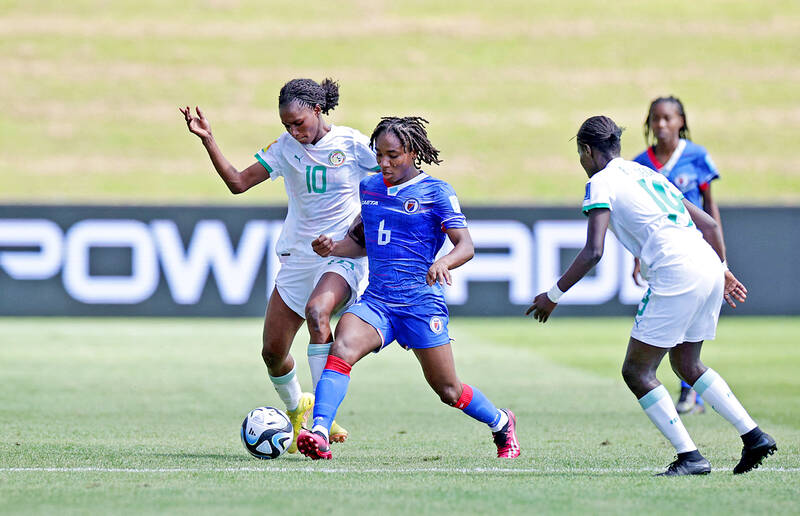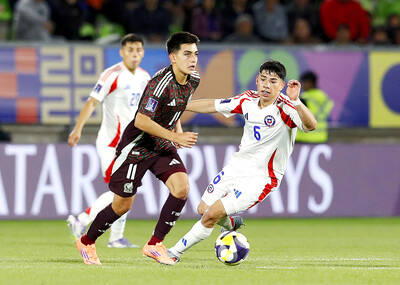They do not have any sponsors, their training center closed because of gang violence and some of their biggest fans cannot afford a TV. Haiti’s soccer team earned a place at the FIFA Women’s World Cup despite all those obstacles, and remain undeterred.
Haiti are to make their debut at the Women’s World Cup in Australia and New Zealand later this month following a historic win over Chile that gave a boost to a nation reeling amid deepening poverty, violence and political instability.
France-based midfielder Melchie “Corventina” Dumornay scored twice in that 2-1 win over Chile in New Zealand in a qualifying tournament that decided the last three of 32 spots at the tournament.

Photo: Reuters
“The Haitian team will give its all,” said Emmanuel Jean, who coached players, including captain Nerilia Mondesir and Dumornay, when they were younger. “I will watch as Dumornay shows the world what she’s made of.”
It has been almost half a century since Haiti made a World Cup appearance at senior level, with the men playing in 1974.
Jean was a coach at the professional soccer training center in Croix-des-Bouquets, a once peaceful community east of the Haitian capital, Port-au-Prince, that is now controlled by a powerful gang. A surge in killings and kidnappings in the area forced officials to close the center several years ago, forcing the women to play home games in the neighboring Dominican Republic, which shares the island of Hispaniola with Haiti.
Players at the center were previously able to practice twice daily and play matches on Sunday, Jean said. Now, some young players train only once a week on a small field loaned by Haiti’s top private school.
“As you can see, we don’t have a lot, but we do what we can,” Jean said as he pointed to the limited equipment and uniforms donated by supporters.
The school also provides snacks and sandwiches after training.
The soccer program aims to keep children off the street and prevent them from joining gangs, as well as potentially recruit the next big stars. It is run by James Louis-Charles, athletic director at Union School, which opens its soccer pitch to players on Saturdays. The plan was to enroll about 25 children, but about 50 children have since joined, many from the sprawling slums nestled in the mountains above the school.
The majority of participants are boys, including 13-year-old Noah Yann Hilarie, who said he would be watching Haiti’s women’s soccer team play later this month.
“Maybe they’ll reach the quarter-finals. That would be huge, amazing,” he said. “I hope that happens.”
Haiti, 53rd of 188 nations in FIFA’s women’s rankings, face three soccer powerhouses in Group D: European champions England on July 22, China on July 28 and Denmark on Aug. 1.
Haiti coach Nicolas Delepine called it “the toughest group” in an interview with So Foot, a Paris-based magazine, but he said the team has a lot of support in Haiti.
“[Soccer] is like a religion there. The country has been doing very badly since the earthquake and the succession of hurricanes, so the population is clinging to that,” he told the magazine.
It is common to see boys playing soccer in neighborhoods across Haiti, although the number of street matches have dwindled because of the gang-related turf wars that have killed hundreds of innocent people in the capital and beyond. However, it is rare to see girls playing and that is something Louis-Charles wants to change.
“It’s really a question of giving them the opportunity and letting the parents also understand that, hey, the girls should have the same opportunity as the boys to play soccer,” he said. “The boys are out in the streets doing whatever they want and the girls are at home doing the household chores.”
Alanda Dorval is one of the few exceptions.
The 15-year-old attacker plays up to two hours on the street when she is not training at the school on Saturdays.
“I like to make goals,” she said, adding that Dumornay is her favorite player and that she hopes to watch all Haiti’s matches on TV.
During a recent practice at the school, Dorval scored five goals in less than 30 minutes, a wide smile on her face.
Watching from the sidelines was Jean, the coach.
“At 14, she exploded,” he said of Dorval’s skills. “She was playing like she already had won an international match.”
Dorval and her teammate, 13-year-old Dor Neika, follow Haiti’s women’s team and want to play professionally.
“I want to become a star like Vinicius,” Neika said, referring to Vinicius Jr, a Brazilian who plays for Real Madrid and has been the target of vicious and high-profile racist attacks in Spain.
As the World Cup approaches, Haitian fans like Sheila Privert, who runs a local organization for handicapped children, will be watching, albeit on her phone because she rarely has electricity at her home.
“That’s what I want to see, for the women to make strides in this sport,” she said as she watched her seven-year-old son play.
“I have a lot of confidence in the team,” she added.
As does the team, having beaten Moldova 3-1 in their last warm-up game before the tournament.
Mondesir, who became the first Haitian woman to play professionally in France, told FIFA that the team is confident in its abilities, especially its cohesiveness.
“We do everything together. Even when we lose, we fight for every blade of grass,” she said. “We’re battlers. That’s probably our best quality.”

Jesper Boqvist on Tuesday scored the go-ahead goal midway through the third period as the Florida Panthers, after raising their second straight NHL Stanley Cup banner, opened the defense of the title by beating the Chicago Blackhawks 3-2. Mackie Samoskevich — getting his second assist, the fifth two-point game of his career — chipped the puck toward the goal and Boqvist knocked it out of the air for the lead with 10 minutes, 20 seconds left. A.J. Greer and Carter Verhaeghe also had goals for Florida, who got 17 saves from Sergei Bobrovsky. Frank Nazar had a goal and an assist and Teuvo

HOMETOWN ZERO: Fans relished the fall of former Brewer-turned-Cubs manager Craig Counsell, as Milwaukee braces to face the Dodgers, who in 2018 denied them a pennant Milwaukee Brewers manager Pat Murphy has referred to his team as the “Average Joes,” a nod to their small-market status and lack of big names, but after they beat rivals the Chicago Cubs 3-1 in the decisive fifth game of their National League Division Series (NLDS) on Saturday night, Murphy decided it was time for an upgrade. “You can call them the average Joes, but I say they’re the above-average Joes,” he said. The Brewers relied on contributions from just about every player to get past the Cubs. Andrew Vaughn hit a tiebreaking homer in the fourth inning, and William Contreras and Brice

Mexico’s teenage playmaker Gilberto Mora has lit up the FIFA U-20 World Cup in Chile as he basks in the limelight afforded by the absences of Barcelona and Real Madrid stars Lamine Yamal and Franco Mastantuono. “I don’t know if I’m the biggest star, and I’m not really interested in that. I think you can always give more,” 16-year-old Mora said before Mexico’s 4-1 win against host nation Chile in the round-of-16 on Tuesday, in which he provided the assist for the opening goal. Next on Mora’s schedule is a quarter-final clash against Argentina this morning Taiwan time, but after

‘SOMETHING SPECIAL’: Nathan Lukes hit a two-run single and Addison Barger had three of Toronto’s 12 hits as the Blue Jays bounced back After taking down the storied New York Yankees in their own ballpark in their American League Division Series on Wednesday, Toronto Blue Jays manager John Schneider was ready to revel in the triumph. “Start spreading the news,” Schneider said while popping a bottle of bubbly to set off the Blue Jays’ jubilant celebration inside their Yankee Stadium clubhouse. With the party under way, the familiar lyrics from Frank Sinatra’s version of New York, New York — the Yankees’ long-time victory anthem — sounded in the background as roaring Toronto players sprayed each other with booze in the Bronx. This time, it was their